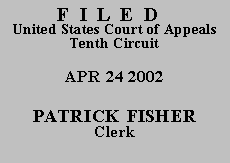

| ANDREW LEE FERGUSON,
Plaintiff - Appellant,
v.
NEW MEXICO CORRECTIONS
DEPARTMENT; ROBERT J. PERRY,
Secretary of Corrections, Defendants - Appellees. |
No. 01-2327
(D.C. No. CIV-01-889-JP/LFG) (D. New Mexico) |
In 2000, defendants implemented a new legal access program based on the Supreme Court's decision in Lewis v. Casey, 518 U.S. 343 (1996). Under this policy, inmates no longer have access to case law, the complete United States Code, and other previously available litigation aids. Mr. Ferguson alleged in his complaint that defendants now charge indigent inmates for legal implements, provide only one hired legal aide for the entire prison population instead of allowing inmate assistants, and do not provide inmates with representation in grievance proceedings.
Mr. Ferguson brings several constitutional challenges arising from the revised policy. He contends that the new policy denied him his constitutional right of access to the courts due to the lack of case law authority, the lack of legal assistance, and the prison practice of charging indigent inmates for copies of legal material, notary services, and legal phone calls and mail. The district court dismissed these claims under Lewis upon concluding that Mr. Ferguson had not shown the requisite prejudice. We agree.
The Court in Lewis made very clear that an inmate alleging that a prison has violated his right of access to the courts must show actual prejudice, see Lewis, 518 U.S. at 349, and further held that "an inmate cannot establish relevant actual injury simply by establishing that his prison's law library or legal assistance program is subpar in some theoretical sense," id. at 351. Notwithstanding this explicit admonition, most of Mr. Ferguson's allegations merely charge that because in his view the prison's legal access program is inadequate, he and other inmates must have been hindered in pursuing litigation. While Mr. Ferguson does allege that his previous civil suit was unsuccessful, he has offered no facts to show that his ability to pursue nonfrivolous litigation was hindered by the lack of case law, legal assistance, or the fees to which he objects. See Hall v. Bellmon, 935 F.2d 1106, 1110 (10th Cir. 1991) (although pro se pleadings are to be construed liberally, conclusory allegations are not enough).
In a related argument, Mr. Ferguson contends the unavailability of case law has denied him his right to self-representation guaranteed under the Sixth Amendment. As the district court pointed out, however, the Sixth Amendment by its terms applies only to criminal proceedings(1) and Mr. Ferguson has raised this claim with regard to civil litigation. Moreover, Mr. Ferguson's failure to show that the lack of case law prejudiced his access to the courts is equally dispositive of this claim.
Mr. Ferguson argues that defendants' failure to provide legal assistance in inmate disciplinary proceedings is a denial of due process. The district court dismissed this claim because Mr. Ferguson failed to demonstrate actual personal injury. Nothing in Mr. Ferguson's pleadings or in the record before us tends to show that the lack of legal assistance rendered his prison disciplinary proceedings unconstitutional.
Finally, Mr. Ferguson asserts that defendants abridged his First Amendment right to petition the government for redress of grievances. See Hilton v. City of Wheeling, 209 F.3d 1005, 1006 (7th Cir. 2000). As a factual basis for this claim, Mr. Ferguson states he prepared a complaint, with attachments, intending to submit the material to the state secretary of state in order to call attention to what he perceived as the prison's failure to comply with the law governing inmate access to the courts. The legal aide in the prison law library refused to make copies because the material did not constitute a qualified legal claim under prison policy. Mr. Ferguson then sent the material to the state public defender's office with a request that it provide him with copies and forward the material to the secretary of state. Mr. Ferguson alleges that the public defender's office did not honor his request and that he never saw the material again.(2)
Assuming Mr. Ferguson's desire to send a complaint to the secretary of state could be viewed as an attempt to petition the government for a redress of grievances, he has failed to show defendants abridged that right. Although defendants refused to provide Mr. Ferguson with copies of the material he wished to send the secretary of state, the legal aide returned the material to him. Defendants did not prevent Mr. Fisher from thereafter submitting the material directly to the state official instead of to the public defender's office.(3)
We DENY Mr. Ferguson's request to proceed on appeal in forma pauperis and DISMISS his appeal.
ENTERED FOR THE COURT
Stephanie K. Seymour
Circuit Judge
*.After examining appellant's brief and the appellate record, this panel has determined unanimously that oral argument would not materially assist the determination of this appeal. See Fed. R. App. P. 34(a)(2) and 10th Cir. R. 34.1(G). The case is therefore submitted without oral argument. This order and judgment is not binding precedent, except under the doctrines of law of the case, res judicata, or collateral estoppel. The court generally disfavors the citation of orders and judgments; nevertheless, an order and judgment may be cited under the terms and conditions of 10th Cir. R. 36.3.
1. The Sixth Amendment provides that "[i]n all criminal prosecutions, the accused shall enjoy the right . . . to have the Assistance of Counsel for his defence." U.S. Const. amend. VI (emphasis added).
2. Thus, Mr. Ferguson also failed to allege any injury with respect to his First Amendment claim.
3. We imply no criticism of the public defender's office. Public defenders carry a heavy load and Mr. Ferguson's request does not fall within their duties.